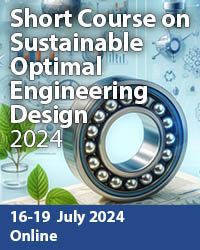Description
There are many reasons why environmental issues should be considered in the design and product development process, for example, to help meet customer and legislative requirements; to strengthen competitive and commercial position; to maintain innovative credibility. Most important of all is to reduce the overall environmental impact of products across their lifecycle.
The course will demonstrate the environmental impacts of bearings in terms of embodied energy (energy consumed during production), carbon footprint, and eco-indicators of bearing range for a variety of application. New bearings designed on the concept of green design include seal technologies (hard seal coatings and surface design); light-weight parts (polymers), and ‘lub-for-life” thin film lubrication, which makes re-lubrication unnecessary throughout a bearing’s lifespan. An estimated 50 billion bearings are in use at any time and reduction in energy consumption by a 30-70% depending on the type of use can be a tremendous savings in energy. It would consequently reduce carbon dioxide emissions in the atmosphere as well as savings in resources and money. It will also lead to enormous reduction in the lubricant disposal. For example, ships trading in the world’s oceans and seas can eliminate both operational and accidental stem tube oil pollution, while also reducing their operating costs.
In this age of Industry 4.0, the design principles and practice must include the nature of industry today not 100 years old practices. The topics included are most of the concerns and ideas discussed briefly above.
The lecture and presentations should attract experts and professionals from industry as well as academia.
Programme
Over the course of four days, the following topics will be considered
- Sustainability and Ecological Considerations in Engineering Product Development.
- Mathematical techniques used in sustainable optimal design; including Life Cycle Analysis (LCA) for engineering design.
- Sustainable Consideration and Mathematics of Recyclability, Reuse, and Circular Economy.
- Practical and useful applications of sustainability in green power generation, disassembly and recycling, and time elements in assembly and disassembly.
- Ecological considerations and sustainability in manufacturing.
- Green design and manufacture of sustainable products in the age of Industry 4.0.
Presenter
|
Dr Nand K Jha graduated from the Indian Institute of technology (IIT), Delhi with a PhD in 1977. Dr Jha has been engaged in teaching and research since then, publishing more than 100 articles in journals and conferences. Dr Jha has authored three books including one under publication. These books are about design, manufacturing, sustainability, green design, sustainable manufacturing including automation, flexible manufacturing, control, and optimal design and manufacturing. One of his textbooks “Green Design and Manufacturing for Sustainability” won The Most Promising New Textbook award in 2017 and has been used in Schools of Engineering worldwide. This book encompasses circular manufacturing and circular economy. Dr Jha’s research papers include the analytical and life cycle analysis approach for cost and power minimization, waste minimization, and reduction of material consumption during manufacturing. His new book (under publication) deals with an important interlinking of optimization and sustainability. Dr Jha has also contributed chapters in 4-5 books published by other authors. Dr Jha has developed relations to bring environmental impact into Mechanical Engineering. Negative impacts of the environment on both design and manufacturing, including the broader concept of engineering, have been presented into the articles like integration of sustainability into engineering mechanics and mechanical engineering, have been broadly discussed and investigated by Dr Jha during his 42 years as a mechanical engineering researcher and teacher. |
 |


 Wessex Institute
Wessex Institute